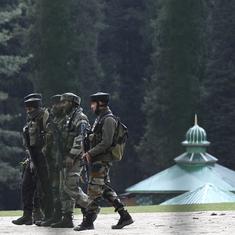As older Bombay residents know, the city was consumed by riots that started on December 7, 1992, the day after Bharatiya Janata Party workers and their Hindutva allies demolished the Babri Masjid in the temple-town of Ayodhya in Uttar Pradesh. In January, the violence erupted again, this time manifesting itself as targeted attacks on Muslims. Approximately 900 people were killed in the riots. Two months later, on March 12, 1993, a series of bomb blasts rippled down the city’s spine, killing 257 people.
'Now we can understand'
Last fortnight, when discussions about the 1992-1993 riots and the blasts began afresh when it became clear that Yakub Memon would be hanged for his role in planning the bomb attacks, Khan felt he had lived some part of what he had heard. “Earlier we heard how people felt, but didn’t see for ourselves,” he said. “Now we can understand.”
Yakub Memon “was a criminal, but he surrendered” to the authorities, Khan said. “So many others have been let off. On humanitarian grounds this hanging was wrong.”
Like Khan, other young Muslims who were born after the violence, or were too young to experience or comprehend the events of those days, are coming to a new political and historical awakening with the events of the past two weeks. Many have taken a renewed interest in the report of Justice BN Srikrishna, which indicted key police officers and several members of the Shiv Sena for their role in the riots. But since it is not incumbent upon the government to take action on the findings of judicial commissions, only three people have been convicted for the riots. By contrast, the special court set up to try the bomb blast conspiracy handed out 100 convictions.
Said Aamir Edresy, 34, a social activist and businessman who was 10 years old when the riots broke out, “The younger generation is now feeling discriminated against, that there is one set of rules for Muslims, and another set of rules for others.” He added, “These young people have heard of these things, but now they have an actual understanding of them.”
As media has proliferated, images are beamed, and news discussions multiply, the occasion has been ripe for learning. “Saffron has won,” said Shaikh Mohammed Faizan, 29, a Govandi businessman who was six years old at the time. “What is happening is not good for India. The country will only get divided further.”
Misunderstanding history
For other young people, history is more academic, less a lived reality. Two years ago, when students of the Tata Institute of Social Sciences, set out to make films on the Bombay events, many didn’t have any idea of that period. They were all born in 1990 or after, meaning they had very little experiential knowledge of the events.
“For many it was a moving and powerful experience to look at the city in a different way,” said Anjali Monteiro, the TISS professor who headed the initiative. “Most didn’t have any idea what happened then because there wasn’t much public discourse. Many of them said working on the films changed their relationship with the city.”
In one of the student films, a Hindu trader speaks of his misunderstanding of history, on how he mixed up which came first: the Babri Masjid demolition or the Bombay riots.
"Many people we came across did think the riots happened after the blasts," said Nitya Menon, 24, one of the students who worked on one of the short films, and who now works in a production house. In her group's film they spoke to those who had been young at the time, and also spoke to young people now. "What struck me was how young people think of the idea of difference," she said.
Another student remembered hearing about the riots as a child but then understanding the nuances of displacement more clearly as a student filmmaker. "It was a very good learning experience," said Krishna Panchal, 25, a former TISS student who now works as a researcher. Her group's film focussed on the communities that had moved out and into different areas after 1993. "We saw that people had also moved on and resumed their lives," she said.
For those born after 1993, the Yakub Memon case and the attendant discussions have become an occasion to reflect on what they thought they had known in terms of chronology or history, but didn’t actually. Harshit Dua, 21, a college student born in 1994, said he had heard about the blasts from his parents, but not about the riots. “First I didn’t read much about this, but I have now in the past month been following the news hardcore,” he said. He expressed little faith in the political class. “Now I see all this is a game played by politicians,” he said. “Everything is being hyped.” He added that those who instigated the riots should also be punished, but doubted that it would actually happen.
Many are still trying to make sense of the events of those days. “Some horrible things happened before we were born,” said Harsh Khara, 20, an engineering student. “The riots and the blasts were two unfortunate events that happened one after the other.”










